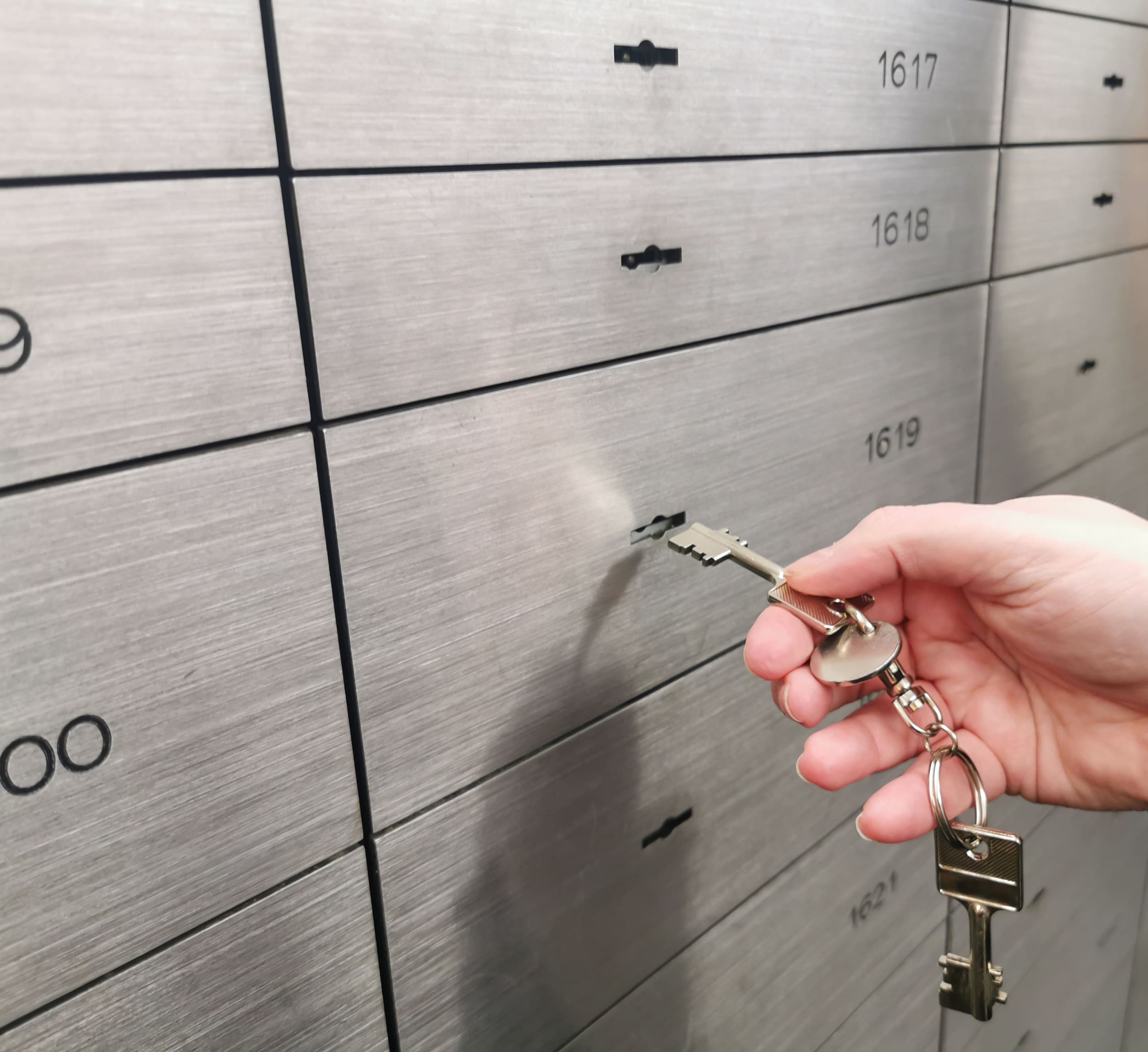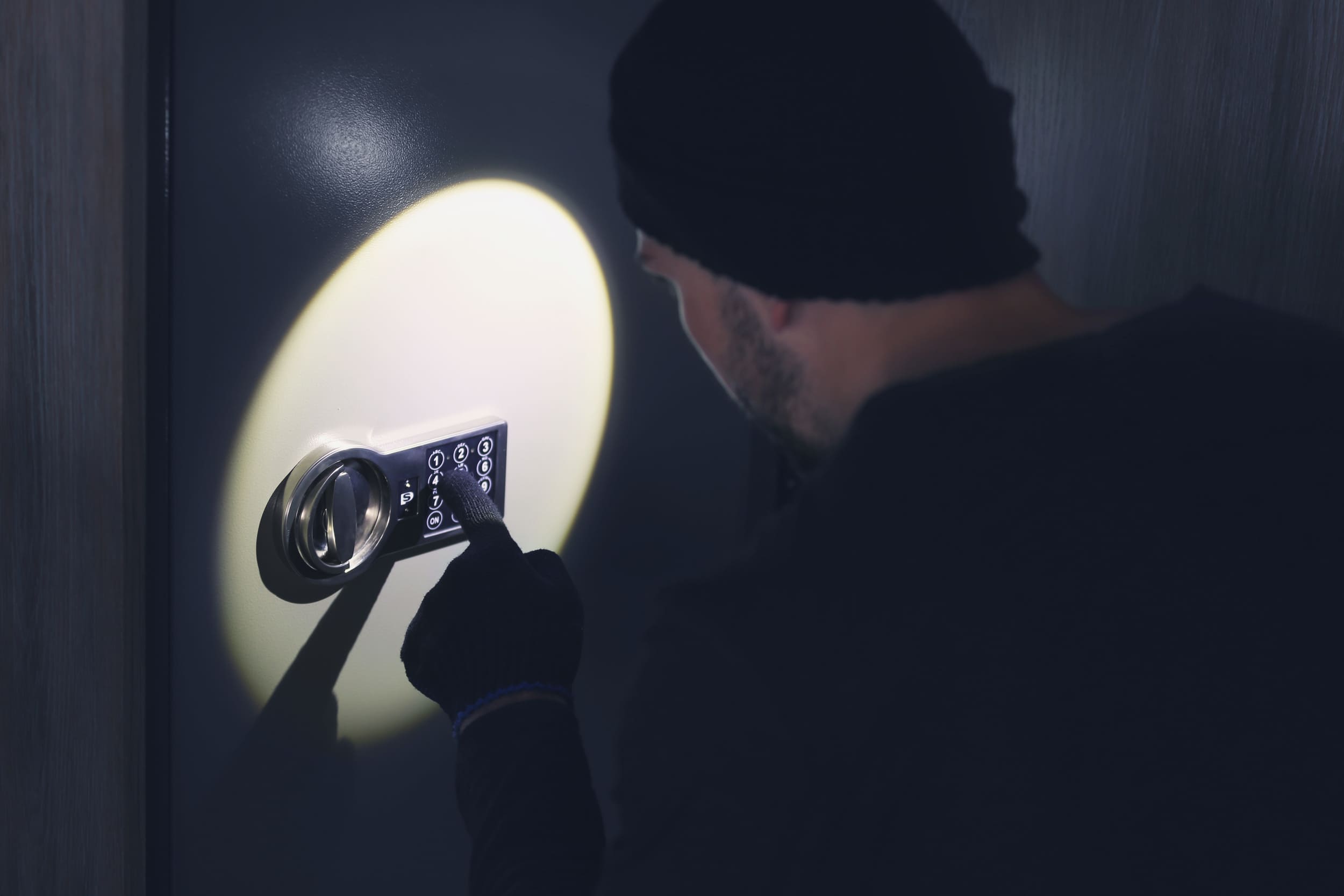Safe deposit boxes and physical security
Additional information > The fundamentals of precious metals – a broad introduction to the basic principles > How much security do safe deposit boxes offer?
Today’s bank safe deposit boxes often no longer meet contemporary security standards
Today, many people maintain a safe deposit box to secure valuables and important documents – or perhaps to store valuable jewellery, precious metals or cash. These boxes typically contain assets worth six or seven-digit sums – often someone’s life savings. But what happens in the event of a burglary? Are these vaults secure enough? And are they all properly insured?
At first glance, bank safe deposit boxes appear secure, convenient and, above all, simple to operate. They are often located in the immediate vicinity of where you live and can be rented in-house relatively easily from your local bank, provided they offer customers such facilities. This can create a feeling of reassurance, because your stored values are in much better hands there than in some more-risky hiding place at home. A bank vault signals both protection and security. Moreover, the safe deposit box contents are known only to the customer, and the contract may even include insurance cover. Seen from this perspective, it’s hardly surprising so many private individuals keep their property in a safe deposit box.

ShDrohnenFly © - stock.adobe.com
Bank safe deposit boxes can create a false sense of security
Customers still regard their bank’s reputation and trustworthiness as a guarantee of the security of their safe deposit boxes. But such perceptions can be ill-founded. The security standards of many such arrangements are outdated and completely inadequate by contemporary standards. This may apply to the structural aspects of physical protection as well as to the insurance cover and liabilities covered in the event of loss claims. The terms and conditions applicable may differ not only from country to country, but also from one bank to another.
In Germany, for example, it is common to offer just basic security covering damage up to a maximum sum insured of 40,000 euros. Full insurance is usually the responsibility of the customer. And here, your own household contents insurance will generally only provide cover if the insurers were previously advised and the sum insured was adjusted to cover the additional risk. And if you want to rent a safe deposit box from a bank in the USA, you have to wrestle with the fact that the contract small print is designed to exclude such liabilities. In some cases, it is quite common for liability to be limited to an amount of ten times the annual fee, and for US courts to rule in favour of such conditions.
To make matters worse, the core business of these financial institutions has shifted from storage and money management to selling investment and finance products. Many bank buildings, and thus their security vaults too, are now showing their age and urgently need to be upgraded and modernised. And as a relic of bygone days, it is not uncommon for new bank branches to be built without any customer safe deposit box facilities at all.
Material technologies and security systems have seen massive advances over recent decades. Nowadays, they must be able to offer protection against the modern methods employed by contemporary burglars, who often use heavy equipment and unusual techniques. So when it comes to safe deposit boxes, security standards from the last century are completely inappropriate and offer little resistance to today’s determined safecrackers.
Bank safe deposit boxes plundered again and again
There are plenty of examples of such occurrences from the recent past, and from all over the world: In 2013, for example, unknown perpetrators calmly drilled a tunnel in Berlin, Germany, so they could break into a neighbouring Volksbank security vault dating from the 1960s. Once inside, they hacked into over 300 safe deposit boxes and stole contents with a total value amounting to around 10 million euros. In 2021, burglars used core drilling equipment to break into a Sparkasse branch near Hamburg and broke open 650 safe deposit boxes. The losses incurred amounted to well beyond 40 million euros. Yet, although safety deficiencies were identified by an expert opinion, the bank refused to reimburse the party incurring the loss for anything in excess of the 40,000-euro sum insured.
The 2015 looting of 73 safe deposit boxes from the underground vault of Hatton Garden Safe Deposit Ltd. – constructed in 1946 in London’s renowned diamond district – is considered one of the biggest robberies in British history. During this episode, a gang of pensioners spectacularly stole jewellery, cash, gold and platinum bars with a total value of £18.5 million. At odds over how to distribute their loot, the ageing thieves were traced and eventually apprehended by Scotland Yard and MI6. Think this story would make a real big-screen thriller? That’s just what happened in 2018 when the British StudioCanal company created a film based on this robbery entitled ‘King of Thieves’, starring Michael Caine.

africa-studio.com (Olga Yastremska and Leonid Yastremskiy) © - stock.adobe.com
In 2020, a customer of the Midwest One Bank in Golden Valley, Minnesota, also had a nasty surprise. Her safe deposit box containing $67,000 in cash had been looted without any trace of a burglary. The bank refused to offer compensation for the loss because the safe deposit box could only be opened with two keys. One weekend in 2016, strangers broke through the roof of the Maspeth Federal Savings Bank in the New York borough of Queens, deactivated the surveillance system, and hacked into dozens of safe deposit boxes. Yet the robbery was not discovered until the following Monday.
Bank-independent safe deposit box facilities at precious metal dealers
Precious metal dealers also offer customers safe deposit boxes stored inside their own in-house vaults. These facilities are totally independent of banking systems and provide many investors with a secure and reliable alternative to a bank safe deposit box. Dealer safe deposit facilities can have both advantages and disadvantages. One positive aspect is that they remove the need to plan the transport of newly purchased gold or silver investments, always a risky option. In this scenario, your precious metal can usually be taken direct to the safe deposit box.
However, many retailers attach certain preconditions to the allocation of a safe deposit box. For example, it may be stipulated that the precious metals must always be bought from the provider, and/or the arrangement may be subject to an agreed minimum spend per year. Furthermore, some precious metal dealers may also make do with old vault systems, since upgrading to modern standards can be very expensive. In such cases, the safe deposit box rental facility is more of a sideline and not the merchant’s core business. So the choice of an appropriate safe deposit box provider is something that should be carefully thought through.
Safe deposit boxes at high-security storage providers
If you value the protection offered by modern security methods and wish to store your assets independent of banks and dealers, you will find a privately run storage company can meet all your requirements. Swiss Gold Safe in Switzerland, for example, can offer a reliable alternative to bank safe deposit boxes. The company specializes in the storage of precious metals, cash and other valuables. As a specialist provider, Swiss Gold Safe builds and operates high-security systems which meet and exceed the very latest security standards. Their newly built safe deposit box systems feature durable building materials, contemporary security technology, and highly professional processing. Swiss Gold Safe offers national and international customers bank-independent safe deposit boxes in Switzerland, as well as bank-independent safe deposit box facilities in Liechtenstein.
Unlike banks or precious metal dealers, the storage of valuables is the company’s main business. And because this represents the company’s livelihood, its entire business focuses on designing and providing personalised individual storage for customers. The company’s security arrangements satisfy all the latest requirements and are continuously reviewed and updated. In addition, the location of company vaults is never made public and is known only to its customers. Company success is thus reflected in the legitimate trust and continuing support of its loyal customers: Since the company was founded in 2006, there have been no incidents or losses. Swiss Gold Safe customers also value the privacy these safe deposit boxes can offer.
Comprehensive insurance for any emergency
In addition to all these standards and security measures, Swiss Gold Safe still goes one step further and offers its customers the option of comprehensive insurance. In addition to basic insurance cover, customers may insure the full value of their safe deposit box contents via a comprehensive insurance cover arranged through the renowned Lloyd’s of London – simply the largest insurance market in the world. Unlike traditional insurance and reinsurance contract arrangements, Lloyd’s is not a single corporation but an international stock exchange trading in insurance cover.
Swiss Gold Safe Ltd insure their safe deposit boxes on the London market. Contracts are concluded through the company without the need to name any individual safe deposit box customer, thus ensuring the highest levels of discretion and anonymity.
Why insure a safe deposit box?
Is comprehensive insurance cover really necessary for your safe deposit box? The rental price includes basic insurance covering a sum insured of up to 25,000 Swiss francs. To avoid the risk of under-insurance, Swiss Gold Safe recommends supplementary insurance for content values in excess of this sum. In the unlikely event of a claim for loss or damage, the process of obtaining full compensation for the loss of material assets will then become far more straightforward.
Safe deposit box insurance for stored goods offers optimal protection against damage caused by burglary, fire, mains water and other risks, as well as natural hazards such as earthquakes, landslip and flooding. The chosen sum insured should represent the full value of the safe deposit box contents. In the event of any loss claim, evidence of value and proof of ownership such as photos, inventory lists, purchase invoices, certificates and other reports will be required.
Physical security for safe deposit boxes – an overview
- Many private individuals consider bank safe deposit boxes a secure option for storing valuable property and documents.
- However, the vaults of many financial institutions are showing their age, and their security standards are outdated. From this perspective, the perceived physical security of bank safe deposit boxes can be misleading.
- The insurance cover included in the rental price may be insufficient in some circumstances. This is definitely a matter the customer should carefully consider.
- As numerous incidents in recent years have shown, thieves often have little trouble breaching the security of classic bank safe deposit boxes.
- Precious metal dealers also offer safe deposit box facilities to their customers. However, these are often associated with a minimum spend or an obligation to purchase.
- In general, only specialist storage providers – such as, for example, Swiss Gold Safe in Switzerland – can guarantee to provide private investors with the high standards of physical safe deposit box security and independence from banks and dealers they demand, and should expect to receive.
- Basic insurance is included in the safe deposit box rental. Any additional value can be protected by comprehensive insurance. This arrangement both avoids the risk of under-insurance and offers further insurance cover to protect against natural hazards.

